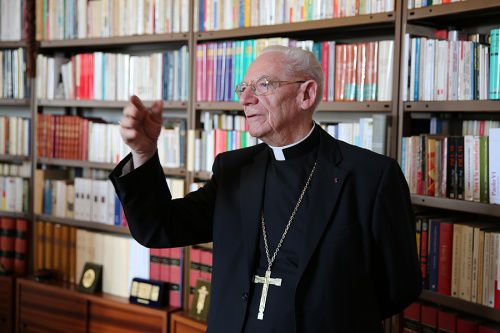Bl. Paul VI was the first 'modern man' to be elected Bishop of Rome, and he put the Church in conversation with the world in order to build a dialogue of salvation, a cardinal who was one of Montini's collaborators said. Cardinal Paul Poupard, 84, had served for 12 years in the Secretariat of State during Bl. Paul VI’s pontificate. He later served, from 1979, as pro-president of the Secretariat for Non-Believers, renamed in 1988 the Pontifical Council for Culture. “Paul VI was the first modern man to be elected Pope,” Cardinal Poupard told CNA Oct. 17. Cardinal Poupard remembered that “during the homily of the Mass of the beginning of his Petrine ministery, he addressed the voices of the modern world, and asked if the Church would be able to listen to them.” This question led to the publication of his first encyclical, Ecclesiam Suam, on the Church. “Paul VI was a very good friend with the French philosopher Jean Guitton. In a walk in the gardens of the papal residence in Castel Gandolfo, the Pope asked Guitton which subject he would have chosen for an encyclical, if he had been Pope. Guitton said he would have chosen truth. And the Pope responded: ‘You are right on the final scope, since the papal Magisterium deals with transmitting truth. But, to partake truth with others, to transmit truth to the world, we have to dialogue.'” “Paul VI’s Church is a Church that listens to people before speaking, makes conversation and dialogue with the world. But it is a dialogue of salvation, in order to bring the world to salvation,” Cardinal Poupard commented. This dialogue was somehow broken, since Bl. Paul VI said in 1968 that “from some fissure, the smoke of Satan has entered the Church.” Cardinal Poupard recounted: “I lived this very intense moment. Paul VI’s claim came by the fact that the Council had gone toward the modern world to convert it. But this missionary effort had turned into a general protest. In the name of the Council, a counter-Council was being held.” This counter council led to a “haemorrhage in the big religious orders; many people left the Church. It was a horrible suffering for the Pope. Paul VI was in this sense a martyr of the Church, because he lived a suffering for the Church, coming from the Church herself.” In 1968, Bl. Paul VI issued his last encyclical, Humanae vitae, which has been taken as a model for the Synod of Bishops on the family. The encyclical reaffirmed the teaching of the Church on the regulation of birth, but received many protests, even from inside the Church. After that, Bl. Paul VI did not promulgate any other encyclical, though he remained Pope for another 10 years. Cardinal Poupard remembered the times of the preparation of Humanae vitae, the establishment of the commissions that had to study the issues at stake, the many expectations around the Pope’s decision. “Paul VI told me: ‘Things are difficult, complex. The Pope must meditate before making a decision… since when a decision is made, it is irrevocable.'' After the issuance of the encyclical, “there was a sort of refusal of it by the western world, and even entire bishops' conferences distanced themselves from it.” Cardinal Poupard said: “I would read the decision this way: after the protests against Humanae vitae, the Pope did not want to expose the Church to this worrying and painful distance from the bishops' conferences. So he continued his Magisterium through apostolic letters and other means.” The cardinal also revealed that “the first telegram we received in the state secretariat after the publication of Humanae vitae was that of Bishop Helder Camara.” Bishop of Recife, in Brazil, Helder Camara was well known for his commitment to and advocacy for the poor. “He wrote to the Pope: ‘Thank you, Holy Father, for defending us in the third world, since the rich world is attacking its only richness: children’,” Cardinal Poupard remembered.

